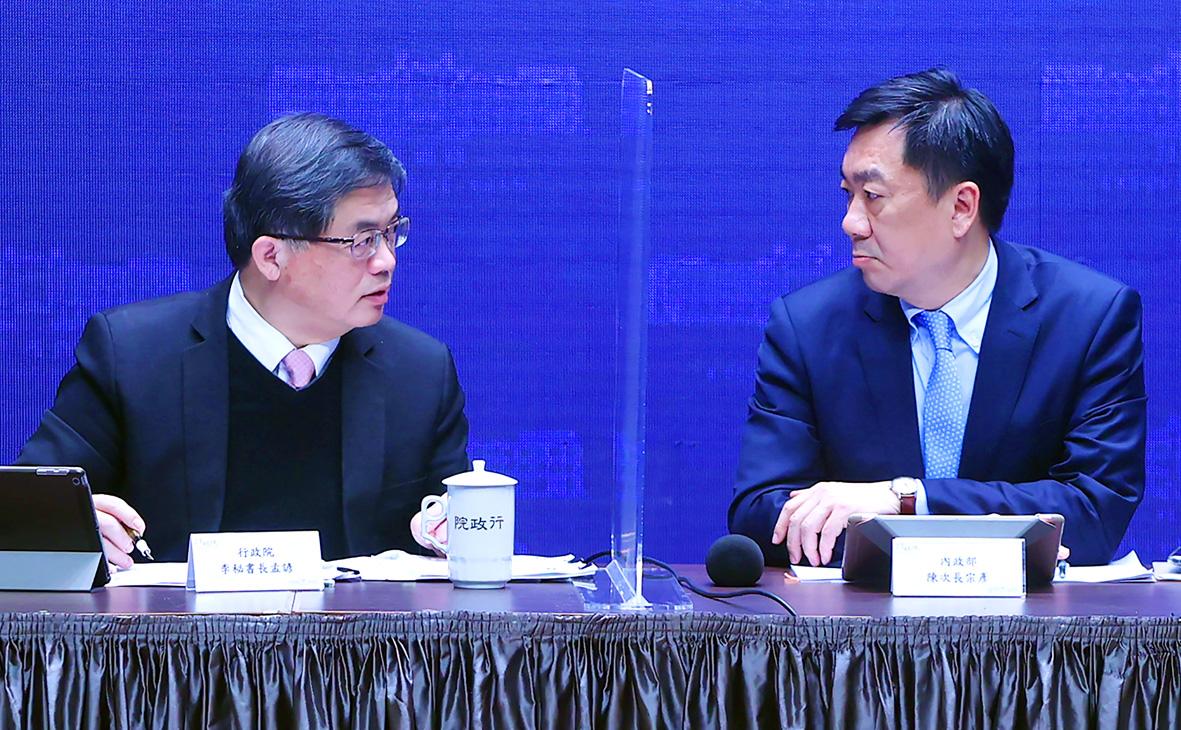The Executive Yuan yesterday unveiled livelihood policies to be implemented next month, including adjustments to the minimum wage, adjustments to the basic living expenses for filing taxes and the establishment of a farmers’ pension fund.
Executive Yuan Secretary-General Li Meng-yen (李孟諺) made the announcements at a news conference in Taipei following the Executive Yuan’s weekly meeting.
On Friday next week, the monthly minimum wage would rise to NT$24,000 (US$840.54) from NT$23,800, and the hourly minimum wage would rise to N$160 from NT$158, Li said, adding that the policies would benefit about 2.08 million salaried workers.

Photo: CNA
Farmers are to make monthly contributions to the Farmers’ Pension Fund that the government would match for 40 years, Li said.
When they retire, farmers would receive a pension of NT$45,000 per month, he said.
The Farmers’ Insurance Act (農業保險法), which President Tsai Ing-wen (蔡英文) signed into law on May 27, would be promulgated to subsidize one-third to one-half of monetary losses in the agricultural sector incurred by natural disasters, disease or market fluctuations, he said.
The Council of Agriculture is to allocate NT$10 billion to the Agricultural Insurance Fund per year, which is expected to stabilize agrarian income, he said.
Subsidies for public-school lunches are to rise to NT$6 per meal from NT$3.5, while the Executive Yuan is to require that schools only use ingredients certified as produced in Taiwan, he said.
The basic living expense — as defined by the income tax filing system to calculate personal tax exemptions — is to rise to NT$18,200 from NT$17,500, which is expected to benefit 20,500 households when they file taxes in May, he said.
Publishers involved in book imports or exports would be able to apply for business tax exemptions, he said.
People who buy masks through the government’s rationing program, which allows nine masks to be bought every two weeks at a fixed price of NT$45, would be able to buy 10 masks per 14 days for a fixed price of NT$40, Li said.
Separately yesterday, the Ministry of Labor’s Bureau of Labor Insurance said that the labor insurance premium is to be increased to 11.5 percent.
This means an estimated increase of NT$28 to NT$46 per month in an employee’s share of the labor insurance premium, and an estimated increase of NT$84 to NT$160 per month in the employer’s share, the bureau said.
National pension premiums are to increase to 9.5 percent from 9 percent, as the current premiums would not cover the National Pension Fund for the next two decades, the Ministry of Health and Welfare’s Department of Social Insurance said.
The measure is expected to add NT$1.69 billion to the fund, it said.
About 3.02 million people would pay higher premiums, including 2.7 million people who are normal-status insurance payers, who are expected to pay an additional NT$55 per month, department Director Shang Tung-fu (商東福) said.
Additional reporting by CNA

LONG FLIGHT: The jets would be flown by US pilots, with Taiwanese copilots in the two-seat F-16D variant to help familiarize them with the aircraft, the source said The US is expected to fly 10 Lockheed Martin F-16C/D Block 70/72 jets to Taiwan over the coming months to fulfill a long-awaited order of 66 aircraft, a defense official said yesterday. Word that the first batch of the jets would be delivered soon was welcome news to Taiwan, which has become concerned about delays in the delivery of US arms amid rising military tensions with China. Speaking on condition of anonymity, the official said the initial tranche of the nation’s F-16s are rolling off assembly lines in the US and would be flown under their own power to Taiwan by way

CHIP WAR: The new restrictions are expected to cut off China’s access to Taiwan’s technologies, materials and equipment essential to building AI semiconductors Taiwan has blacklisted Huawei Technologies Co (華為) and Semiconductor Manufacturing International Corp (SMIC, 中芯), dealing another major blow to the two companies spearheading China’s efforts to develop cutting-edge artificial intelligence (AI) chip technologies. The Ministry of Economic Affairs’ International Trade Administration has included Huawei, SMIC and several of their subsidiaries in an update of its so-called strategic high-tech commodities entity list, the latest version on its Web site showed on Saturday. It did not publicly announce the change. Other entities on the list include organizations such as the Taliban and al-Qaeda, as well as companies in China, Iran and elsewhere. Local companies need

CRITICISM: It is generally accepted that the Straits Forum is a CCP ‘united front’ platform, and anyone attending should maintain Taiwan’s dignity, the council said The Mainland Affairs Council (MAC) yesterday said it deeply regrets that former president Ma Ying-jeou (馬英九) echoed the Chinese Communist Party’s (CCP) “one China” principle and “united front” tactics by telling the Straits Forum that Taiwanese yearn for both sides of the Taiwan Strait to move toward “peace” and “integration.” The 17th annual Straits Forum yesterday opened in Xiamen, China, and while the Chinese Nationalist Party’s (KMT) local government heads were absent for the first time in 17 years, Ma attended the forum as “former KMT chairperson” and met with Chinese People’s Political Consultative Conference Chairman Wang Huning (王滬寧). Wang

OBJECTS AT SEA: Satellites with synthetic-aperture radar could aid in the detection of small Chinese boats attempting to illegally enter Taiwan, the space agency head said Taiwan aims to send the nation’s first low Earth orbit (LEO) satellite into space in 2027, while the first Formosat-8 and Formosat-9 spacecraft are to be launched in October and 2028 respectively, the National Science and Technology Council said yesterday. The council laid out its space development plan in a report reviewed by members of the legislature’s Education and Culture Committee. Six LEO satellites would be produced in the initial phase, with the first one, the B5G-1A, scheduled to be launched in 2027, the council said in the report. Regarding the second satellite, the B5G-1B, the government plans to work with private contractors